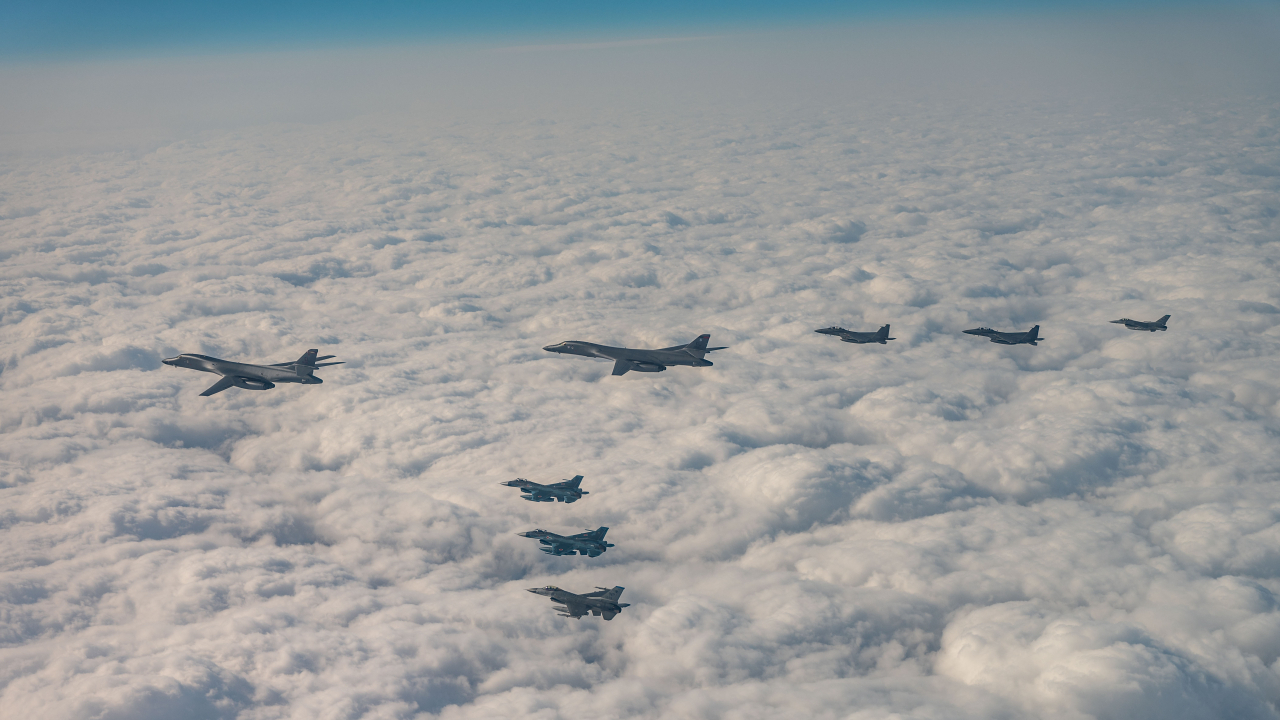US deploys B-1B bombers near Korean Peninsula after NK ICBM launch
By YonhapPublished : Dec. 20, 2023 - 19:20

US B-1B strategic bombers took part in a joint aerial exercise that South Korea, the United States and Japan held over waters around the Korean Peninsula on Wednesday in a show of force after North Korea's launch of an intercontinental ballistic missile.
The exercise took place over waters east of the southern island of Jeju, where the air defense identification zones of South Korea and Japan overlap, the Joint Chiefs of Staff said, amid heightened tensions in the wake of the North's firing of the Hwasong-18 solid-fuel ICBM into the East Sea on Monday.
South Korean F-15K, U.S. F-16 and Japanese F-2 fighter jets escorted two B-1B bombers in a formation flight, photos of the exercise released by the JCS showed.
"This exercise was planned ... to strengthen the three countries' capabilities to respond to North Korea's nuclear and missile threats, including its firing of a solid-fuel ICBM, and to demonstrate the strong resolve for joint response," the JCS said in a release.
The latest deployment marked the 13th time a US strategic bomber, including the nuclear-capable B-52H, has been deployed to the Korean Peninsula or its nearby area this year, according to the JCS.
The B-1B, which is no longer nuclear capable, has previously been deployed to the peninsula area five times this year, according to the defense ministry.
The trilateral air exercise also marked the latest of its kind since the three countries held the first-ever standalone one in October, involving a US B-52H bomber, over waters south of the peninsula.
Seoul, Washington and Tokyo have recently bolstered security ties in the face of evolving military threats from North Korea. The Hwasong-18 launch on Monday marked the North's fifth ICBM launch this year.
On Tuesday, the three countries fully activated a system to share North Korean missile warning data in real time and approved a multiyear plan for trilateral military drills.
In August, President Yoon Suk Yeol, US President Joe Biden and Japanese Prime Minister Fumio Kishida agreed to operationalize the system by the end of this year and hold "annual, named, multi-domain" trilateral exercises on a regular basis at their Camp David summit. (Yonhap)






![[Weekender] How DDP emerged as an icon of Seoul](http://res.heraldm.com/phpwas/restmb_idxmake.php?idx=644&simg=/content/image/2024/04/25/20240425050915_0.jpg&u=)


![[Music in drama] An ode to childhood trauma](http://res.heraldm.com/phpwas/restmb_idxmake.php?idx=644&simg=/content/image/2024/04/25/20240425050929_0.jpg&u=)









![[Herald Interview] Mistakes turn into blessings in street performance, director says](http://res.heraldm.com/phpwas/restmb_idxmake.php?idx=652&simg=/content/image/2024/04/28/20240428050150_0.jpg&u=20240428174656)
